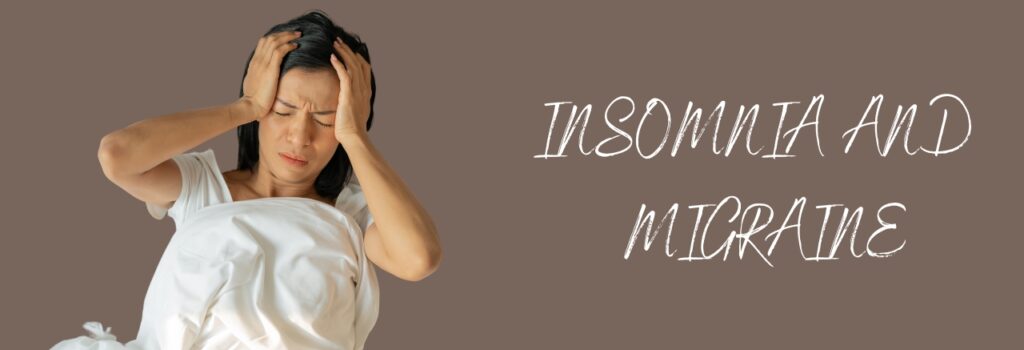Insomnia is a common sleep disorder that affects millions of people worldwide. It is characterized by difficulty falling asleep, staying asleep, or waking up too early in the morning. Insomnia can have a significant impact on a person’s daily life, including their mood, energy levels, and ability to concentrate. In this article, we will explore the causes, symptoms, and treatments of insomnia.
Causes of Insomnia:
There are several factors that can contribute to insomnia, including:
- Stress: Stress is one of the most common causes of insomnia. People who are under a lot of stress may have trouble falling asleep or staying asleep.
- Anxiety: Anxiety can cause racing thoughts and feelings of worry, which can make it difficult to fall asleep.
- Depression: People with depression often have trouble sleeping, and insomnia can be a symptom of the condition.
- Medications: Some medications can interfere with sleep, including antidepressants, antihistamines, and pain medications.
- Medical conditions: Certain medical conditions, such as sleep apnea, restless legs syndrome, and chronic pain, can make it difficult to fall asleep or stay asleep.
- Lifestyle factors: Lifestyle factors such as caffeine, nicotine, and alcohol consumption, as well as irregular sleep schedules and a lack of physical activity, can all contribute to insomnia.
- Migraines are a type of headache disorder characterized by recurrent episodes of moderate to severe headache pain, often accompanied by other symptoms such as sensitivity to light, sound, or smells, nausea, vomiting, and visual disturbances. Migraines can last anywhere from a few hours to several days and can significantly impact a person’s ability to perform daily activities.

Symptoms of Insomnia:
The most common symptoms of insomnia include:
1. Difficulty falling asleep: People with insomnia may have trouble falling asleep, even when they are tired.
2. Waking up frequently during the night: People with insomnia may wake up several times during the night and have trouble falling back to sleep.
3. Waking up too early: People with insomnia may wake up earlier than they would like and have trouble falling back to sleep.
4. Daytime sleepiness: People with insomnia may feel tired and have low energy during the day.
5. Irritability: People with insomnia may be more irritable or moody than usual.
6. Difficulty concentrating: People with insomnia may have trouble concentrating, remembering things, or making decisions.
7. Migraine is a neurological condition that can cause severe headaches, often accompanied by other symptoms such as sensitivity to light and sound, nausea, and vomiting. Migraines can be triggered by a variety of factors, including stress, certain foods or drinks, changes in sleep patterns, hormonal changes, and environmental factors such as weather changes or bright lights.
Migraines can be treated with a variety of medications, including pain relievers, triptans, and preventative medications. In addition to medication, lifestyle changes such as regular exercise, healthy eating habits, and stress management techniques can also be effective in preventing or reducing the frequency and severity of migraines.
If you are experiencing frequent or severe headaches or other symptoms of migraines, it’s important to talk to your healthcare provider to determine the underlying cause and develop an appropriate treatment plan.
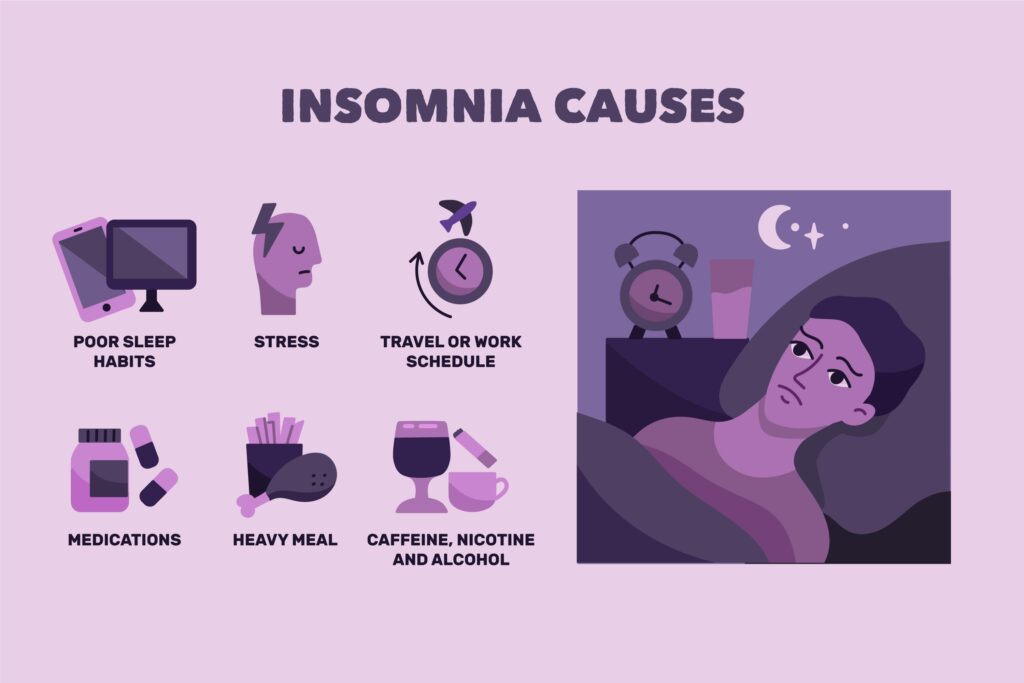
Treatments for Insomnia:
There are several treatments for insomnia, including:
- Cognitive-behavioral therapy (CBT): CBT is a type of therapy that can help people change their thoughts and behaviors related to sleep. CBT can help people develop better sleep habits and learn relaxation techniques to help them fall asleep.
- Medications: There are several medications that can be used to treat insomnia, including benzodiazepines, no benzodiazepine hypnotics, and melatonin agonists. These medications can help people fall asleep and stay asleep, but they can also have side effects.
- Lifestyle changes: Lifestyle changes can also help improve sleep. These may include avoiding caffeine, nicotine, and alcohol before bed, establishing a regular sleep schedule, and getting regular exercise.
- Sleep hygiene: Sleep hygiene refers to the habits and practices that can promote good sleep. This includes things like keeping the bedroom cool and dark, avoiding screens before bed, and establishing a relaxing bedtime routine.
- Relaxation techniques: Relaxation techniques, such as deep breathing and meditation, can help people fall asleep and stay asleep.
- A relief cap is a type of headwear that is designed to provide relief from tension headaches and migraines. It typically consists of a cap or headband with a gel-filled insert that can be chilled in the refrigerator or freezer. The cap is then worn over the forehead to provide a cooling sensation that can help alleviate pain and discomfort associated with headaches or migraines and insomnia

Migraines and insomnia are two common health issues that affect millions of people worldwide. While they are separate conditions, they are often closely related, with one condition exacerbating the other. In this text, we will explore the causes, symptoms, and treatments for migraines and insomnia, as well as the relationship between the two conditions.
It is also important to note that insomnia can have a significant impact on mental health. Insomnia is often comorbid with depression and anxiety, and it can exacerbate symptoms of these conditions. Lack of sleep can also impair cognitive function, making it difficult to concentrate, remember things, and make decisions.
If left untreated, chronic insomnia can lead to serious health problems, including obesity, diabetes, cardiovascular disease, and decreased immune function. It can also increase the risk of accidents and injuries, as well as impair work performance and social relationships.
Therefore, it is essential to address insomnia promptly and effectively. This may involve a combination of treatments, such as medication, therapy, and lifestyle changes. Cognitive-behavioral therapy, in particular, has been shown to be highly effective in treating insomnia. This type of therapy focuses on changing negative thoughts and behaviors that contribute to insomnia, such as worrying about not being able to sleep, using the bed for activities other than sleep, and napping during the day.
Medications can also be effective in treating insomnia, although they should be used with caution and under the guidance of a healthcare provider. There are two main types of medications used to treat insomnia: benzodiazepines and non-benzodiazepines. Benzodiazepines, such as diazepam and lorazepam, are highly effective in promoting sleep, but they can be addictive and cause side effects, such as dizziness and drowsiness. Non-benzodiazepines, such as zolpidem and eszopiclone, are less addictive and have fewer side effects, but they may not be as effective as benzodiazepines.
In addition to medication and therapy, lifestyle changes can also be effective in improving sleep quality. This includes practicing good sleep hygiene, such as avoiding caffeine and alcohol before bed, keeping the bedroom cool and dark, and sticking to a regular sleep schedule. Relaxation techniques, such as deep breathing and meditation, can also help promote relaxation and reduce stress, which can improve sleep quality.
It is also important to address any underlying medical conditions or lifestyle factors that may be contributing to insomnia. For example, if you have a medical condition such as sleep apnea, treating the underlying condition can improve sleep quality. Similarly, if you have a high-stress job or a demanding lifestyle, finding ways to manage stress and prioritize self-care can help improve sleep quality.
It is also important to establish a regular sleep routine and stick to it as much as possible. This means going to bed and waking up at the same time every day, even on weekends. Establishing a relaxing bedtime routine can also help signal to your body that it’s time to sleep. This may include activities such as taking a warm bath, reading a book, or practicing relaxation techniques.
Another important factor to consider is the sleep environment. Creating a comfortable, relaxing sleep environment can help improve sleep quality. This may include investing in a comfortable mattress and pillows, using blackout curtains or a white noise machine to block out external stimuli, and keeping the bedroom cool and dark.
It is also important to avoid certain activities and substances that can interfere with sleep. For example, caffeine, alcohol, and nicotine can all disrupt sleep, so it’s important to limit or avoid these substances, especially in the evening. Similarly, engaging in stimulating activities, such as working on the computer or watching TV, can interfere with sleep, so it’s important to avoid these activities in the hours leading up to bedtime.
Finally, it’s important to be patient and persistent in your efforts to improve sleep quality. It may take some time to establish healthy sleep habits and see improvements in sleep quality, but the benefits are well worth the effort. In addition to improving overall health and well-being, getting enough sleep can also improve mood, cognitive function, and productivity.
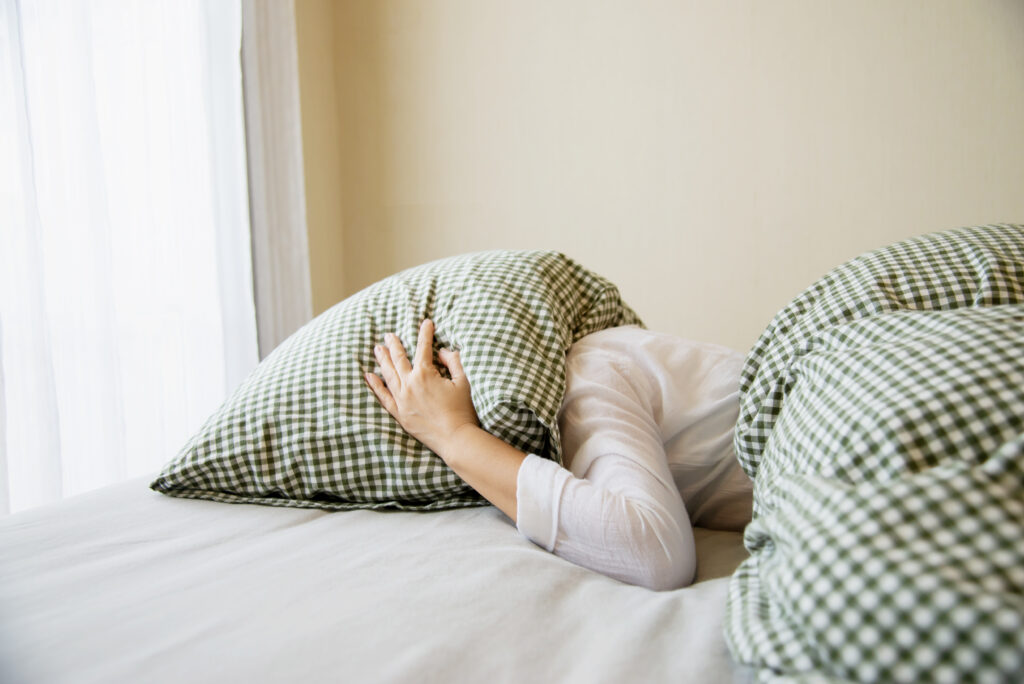
In summary, insomnia is a common sleep disorder that can have a significant impact on a person’s daily life. It can be caused by a variety of factors, including stress, anxiety, depression, medications, and medical conditions. Symptoms of insomnia include difficulty falling asleep, waking up frequently during the night, waking up too early, daytime sleepiness, irritability, and difficulty concentrating. There are several treatments for insomnia, including cognitive-behavioral therapy, medications, lifestyle changes, sleep hygiene, and relaxation techniques. By making some lifestyle changes and adopting healthy sleep habits, you can improve the quality of your sleep and enhance your overall health and well-being. If you are experiencing symptoms of insomnia, it is important to talk to your healthcare provider to determine the underlying cause and the most appropriate treatment for your individual needs.
Migraines are a type of headache that typically cause intense pain on one side of the head. They can also cause other symptoms such as sensitivity to light and sound, nausea, and vomiting. Migraines can last anywhere from a few hours to several days and can be debilitating for those who suffer from them. While the exact cause of migraines is not fully understood, researchers believe that genetics, hormonal changes, and environmental factors may all play a role.
Insomnia, on the other hand, is a sleep disorder that makes it difficult for people to fall asleep or stay asleep. Insomnia can be caused by a variety of factors, including stress, anxiety, depression, medications, and medical conditions. People with insomnia often feel tired and irritable during the day and may have difficulty concentrating or performing everyday tasks.
While migraines and insomnia are separate conditions, they are often closely related. Many people with migraines also suffer from insomnia, and the lack of sleep can exacerbate migraine symptoms. Additionally, people with insomnia may be more likely to develop migraines, as sleep deprivation can trigger migraine attacks.
There are a variety of treatments available for migraines and insomnia. For migraines, over-the-counter pain relievers such as ibuprofen or acetaminophen can be effective for mild to moderate migraines. For more severe migraines, prescription medications such as triptans or ergotamines may be necessary. In some cases, preventive medications such as beta-blockers or antidepressants may be prescribed to reduce the frequency and severity of migraines.
For insomnia, the treatment options depend on the underlying cause of the condition. Lifestyle changes such as establishing a regular sleep schedule, avoiding caffeine and alcohol, and practicing relaxation techniques can be helpful for mild cases of insomnia. For more severe cases, medications such as benzodiazepines or non-benzodiazepine hypnotics may be prescribed. In some cases, cognitive-behavioral therapy (CBT) may be recommended to address underlying psychological factors that may be contributing to insomnia.

In addition to medical treatments, there are also a variety of lifestyle changes that can help manage both migraines and insomnia. Regular exercise, maintaining a healthy diet, and managing stress can all help reduce the frequency and severity of migraines and improve sleep quality. Additionally, avoiding triggers such as certain foods or environmental factors that may trigger migraines can be helpful.
While migraines and insomnia can be difficult conditions to manage, there are many effective treatments available. By working with a healthcare provider to develop a personalized treatment plan and making lifestyle changes, people with migraines and insomnia can improve their quality of life and reduce the impact of these conditions on their daily activities.
In addition to medical treatments and lifestyle changes, there are also complementary therapies that can be effective in managing migraines and insomnia. These therapies include acupuncture, massage therapy, and cognitive-behavioral therapy (CBT). Acupuncture is a form of traditional Chinese medicine that involves inserting thin needles into specific points on the body to stimulate the flow of energy. Studies have shown that acupuncture can be effective in reducing the frequency and severity of migraines and improving sleep quality.
Massage therapy is another complementary therapy that can be helpful in managing migraines and insomnia. Massage therapy involves manipulating the soft tissues of the body to promote relaxation and reduce tension. Studies have shown that massage therapy can be effective in reducing the frequency and severity of migraines and improving sleep quality.
CBT is a form of therapy that focuses on changing negative thought patterns and behaviors that may be contributing to migraines or insomnia. CBT can be effective in reducing the frequency and severity of migraines and improving sleep quality by addressing underlying psychological factors.
It is important to note that not all treatments and therapies work for everyone, and it may take some trial and error to find the best treatment plan for each individual. It is also important to consult with a healthcare provider before starting any new treatments or therapies, as they can provide guidance and monitor for any potential side effects or interactions with other medications.
migraines and insomnia are common conditions that can be difficult to manage, but there are many effective treatments and therapies available. By working with a healthcare provider to develop a personalized treatment plan and making lifestyle changes, people with migraines and insomnia can improve their quality of life and reduce the impact of these conditions on their daily activities. Additionally, complementary therapies such as acupuncture, massage therapy, and CBT can be effective in managing these conditions and improving overall well-being.
While there are many effective treatments available for migraines and insomnia, it is important to take a holistic approach to managing these conditions. This includes addressing both physical and psychological factors that may be contributing to these conditions.
One way to address psychological factors is through stress management techniques. Stress can be a trigger for both migraines and insomnia, so learning to manage stress can be an effective way to reduce the frequency and severity of these conditions. Techniques such as deep breathing, meditation, and yoga can all be helpful in reducing stress and promoting relaxation.
Another way to address psychological factors is through therapy. Therapy can help individuals identify and address underlying emotional or psychological issues that may be contributing to migraines or insomnia. This can include addressing issues such as anxiety, depression, or trauma.
It is also important to prioritize self-care and make time for activities that promote relaxation and well-being. This can include activities such as taking a relaxing bath, reading a book, or spending time in nature.
In addition to addressing psychological factors, it is important to address physical factors that may be contributing to migraines and insomnia. This can include making changes to the diet, such as avoiding trigger foods and increasing intake of nutrient-rich foods. It can also include getting regular exercise, which has been shown to improve both migraines and insomnia.
Finally, it is important to prioritize good sleep hygiene to promote better sleep. This can include establishing a regular sleep schedule, avoiding electronics before bedtime, and creating a sleep-conducive environment that is cool, dark, and quiet.

Another important aspect of managing migraines and insomnia is understanding the relationship between the two conditions. As mentioned earlier, lack of sleep can trigger migraine attacks and migraines can make it difficult to sleep. It is a vicious cycle that can be challenging to break. However, by addressing both conditions simultaneously, it is possible to improve both sleep quality and reduce the frequency and severity of migraines.
One strategy for managing both migraines and insomnia is to establish a regular sleep routine. This includes going to bed and waking up at the same time every day, even on weekends. It is also important to create a relaxing sleep environment, such as reducing noise and light in the bedroom and keeping the room cool and comfortable.
Stress management is another important strategy for managing migraines and insomnia. Stress can trigger both conditions, and reducing stress can help improve sleep quality and reduce the frequency of migraines. Techniques such as deep breathing, meditation, and yoga can be helpful in reducing stress and promoting relaxation.
Diet and nutrition also play a role in managing migraines and insomnia. Certain foods and drinks, such as caffeine, alcohol, and processed foods, can trigger migraines and disrupt sleep. On the other hand, a diet rich in fruits, vegetables, whole grains, and lean protein can help improve overall health and reduce the frequency of migraines and insomnia.
In addition to lifestyle changes, it is important to work with a healthcare provider to develop a treatment plan that is tailored to individual needs. This may include medications, such as triptans or hypnotics, as well as complementary therapies, such as acupuncture or massage therapy. It is also important to monitor the effectiveness of treatments and make adjustments as needed.
It is also important to note that migraines and insomnia can affect people of all ages and genders. However, certain factors may increase the risk of developing these conditions. For example, women are more likely than men to experience migraines, and the risk increases during certain hormonal events such as menstruation and pregnancy. Similarly, older adults may be at a higher risk for developing insomnia due to changes in sleep patterns that occur with age.
It is also important to be aware of the potential side effects of medications used to treat migraines and insomnia. For example, some medications used to treat migraines may cause dizziness or drowsiness, which can affect driving and other activities that require alertness. Similarly, some medications used to treat insomnia may cause dependence or withdrawal symptoms if used long-term.
Therefore, it is important to use these medications as directed and to discuss any concerns or side effects with a healthcare provider. It is also important to avoid self-medicating with over-the-counter or prescription medications without first consulting with a healthcare provider.
Finally, it is important to be patient when managing migraines and insomnia. These conditions can be complex and may require time and effort to manage effectively. It is important to stay motivated and to focus on making gradual, sustainable changes to promote overall health and wellbeing.
In summary, migraines and insomnia are common conditions that can have a significant impact on a person’s quality of life. However, there are many effective treatments and strategies available to manage these conditions, including lifestyle changes, complementary therapies, and traditional medications. It is important to work with a healthcare provider to develop a personalized treatment plan and to be patient and persistent in managing these conditions. With the right care and support, people with migraines and insomnia can improve their quality of life and reduce the impact of these conditions on their daily activities.
In addition to traditional treatments and emerging therapies, there are also lifestyle changes that can help manage migraines and insomnia. These changes include maintaining a regular sleep schedule, avoiding caffeine and alcohol before bedtime, practicing relaxation techniques such as meditation and deep breathing, and managing stress through exercise and other activities.
Dietary changes can also play a role in managing migraines. Some people may find that certain foods or beverages trigger their migraines, such as processed foods, aged cheeses, and red wine. Keeping a food diary can help identify triggers and guide dietary changes.
Similarly, regular exercise can help reduce the frequency and severity of migraines, as well as improve sleep quality. However, it is important to start slowly and gradually increase the intensity and duration of exercise to avoid triggering migraines or worsening insomnia.
Complementary therapies such as acupuncture, massage, and cognitive-behavioral therapy (CBT) may also be effective in managing migraines and insomnia. Acupuncture involves the insertion of thin needles into specific points on the body to promote healing and relaxation. Massage can help reduce muscle tension and promote relaxation, while CBT can help address negative thought patterns and behaviors that may contribute to insomnia.
It is important to note that while these complementary therapies may be helpful for some people, they may not work for everyone. It is important to discuss these options with a healthcare provider and to seek out qualified practitioners.
It is also important to address the mental health aspect of migraines and insomnia. Living with these conditions can be challenging and may lead to feelings of anxiety, depression, and stress. It is important to seek out mental health support if needed, such as therapy or counseling, to help manage these feelings and promote overall wellbeing.
Furthermore, it is important to practice self-care and prioritize activities that promote relaxation and reduce stress. This can include taking breaks during the day, spending time in nature, engaging in hobbies or creative pursuits, and spending time with loved ones.
It is also important to be aware of the potential impact of migraines and insomnia on relationships, work, and daily activities. Communication with loved ones and coworkers about the impact of these conditions can help foster understanding and support. Additionally, it may be helpful to make adjustments to work or daily routines, such as taking breaks or adjusting work hours, to better manage symptoms.
Finally, it is important to stay informed and up-to-date on new treatments and research related to migraines and insomnia. This can involve keeping in touch with healthcare providers, reading up on new developments, and participating in clinical trials or research studies.
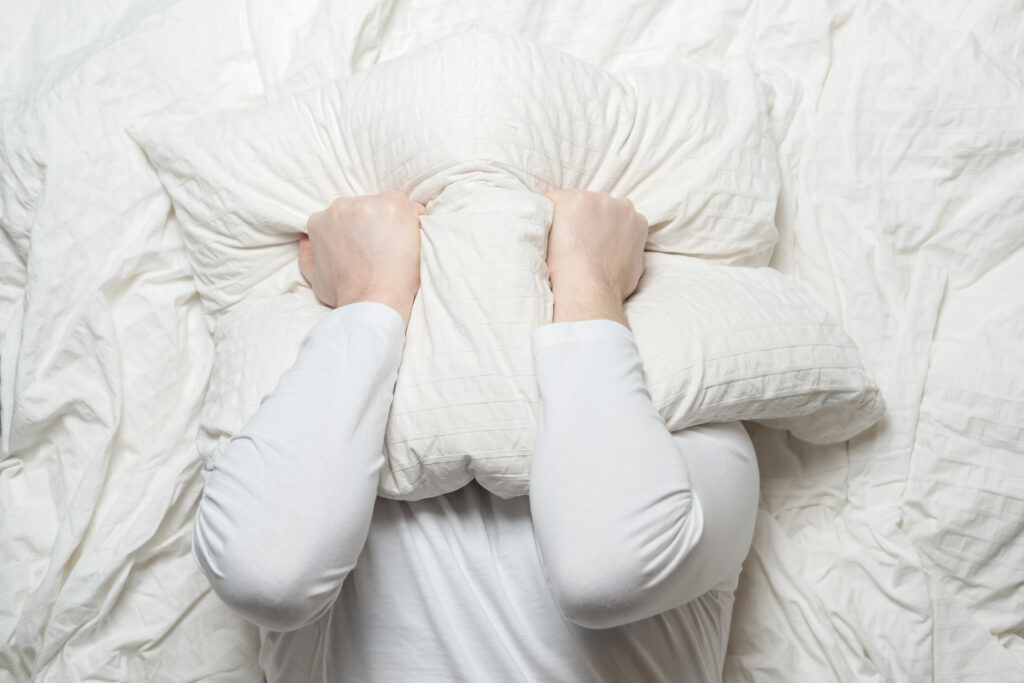
In addition to seeking out mental health support, it is important to educate oneself about migraines and insomnia. This can help individuals better understand their conditions and make informed decisions about their treatment options. Online resources, support groups, and patient advocacy organizations can provide valuable information and support for people with migraines and insomnia.
It is also important to recognize that these conditions can be unpredictable and may require flexibility in daily routines and plans. For example, a migraine attack may require taking a break from work or social activities, while insomnia may require adjusting sleep schedules or taking time off from work to rest.
Support from loved ones can also play a crucial role in managing migraines and insomnia. It is important to communicate openly and honestly with family and friends about the impact of these conditions, and to express needs and boundaries when necessary. Loved ones can also provide practical support, such as helping with household tasks or providing transportation during migraine attacks.
Finally, it is important to prioritize self-compassion and self-care when living with migraines and insomnia. These conditions can be challenging and may lead to feelings of guilt, shame, and frustration. It is important to acknowledge and validate these feelings, while also practicing self-compassion and self-care to promote overall wellbeing.
It is also important to recognize that some people may experience comorbidities or other health conditions in addition to migraines and insomnia. For example, anxiety, depression, and chronic pain are common comorbidities that may exacerbate symptoms and complicate treatment.
In these cases, a comprehensive treatment approach that addresses all health conditions may be necessary. This may involve working with multiple healthcare providers and specialists, such as neurologists, psychiatrists, and pain specialists, to develop a personalized treatment plan.
Furthermore, it is important to prioritize self-advocacy and empowerment when managing migraines and insomnia. This may involve advocating for oneself with healthcare providers, requesting accommodations at work or school, or participating in research and advocacy efforts.
It is also important to recognize the potential impact of societal and cultural factors on the experience of migraines and insomnia. For example, stigma, discrimination, and lack of access to healthcare can create barriers to treatment and support. It is important to work towards addressing these factors and promoting equity and inclusivity in healthcare and society as a whole.
In addition, it is important to recognize the potential impact of lifestyle factors on migraines and insomnia. Certain foods, such as caffeine, alcohol, and processed foods, may trigger migraines or disrupt sleep. It may be helpful to keep a food diary and track symptoms to identify potential triggers and make adjustments to one’s diet.
Regular exercise and physical activity may also have a positive impact on both migraines and insomnia. Exercise has been shown to reduce the frequency and intensity of migraines and improve sleep quality. However, it is important to approach exercise with caution and work with healthcare providers to develop a safe and effective exercise plan.
Additionally, certain relaxation techniques, such as yoga, meditation, and deep breathing, may help reduce stress and promote relaxation, which can in turn improve symptoms of migraines and insomnia. It may be helpful to experiment with different relaxation techniques and find what works best for each individual.
Finally, it is important to be aware of potential medication overuse and dependence. Overuse of pain medication or sleep aids may lead to rebound headaches or worsen insomnia. It is important to work with healthcare providers to develop a safe and effective medication plan, and to regularly reassess the need for medication.
It is also important to recognize the potential impact of environmental factors on migraines and insomnia. For example, bright lights, loud noises, and strong smells may trigger migraines or disrupt sleep. It may be helpful to make adjustments to one’s environment, such as wearing sunglasses, using earplugs, or avoiding certain scents.
Furthermore, it is important to address potential stressors and triggers in one’s personal and professional life. High levels of stress or a lack of work-life balance may exacerbate symptoms of migraines and insomnia. It may be helpful to identify stressors and triggers and develop strategies to manage them, such as practicing time management, seeking support from colleagues or loved ones, or engaging in stress-reducing activities.
In addition, it may be helpful to explore alternative and complementary therapies, such as acupuncture, massage, or aromatherapy. While the evidence for these therapies is limited, some people may find them helpful in managing symptoms and promoting relaxation.
Finally, it is important to have a support system in place to manage the emotional and psychological impact of migraines and insomnia. This may involve joining a support group, seeking individual counseling or therapy, or connecting with others who have similar experiences.
It is also important to understand that migraines and insomnia can have a significant impact on mental health. People with migraines and insomnia may experience increased levels of anxiety, depression, and mood swings. It is essential to recognize and address the emotional and psychological impact of these conditions, as they can exacerbate symptoms and make it more challenging to manage them.
There are several strategies that can help manage the emotional impact of migraines and insomnia. For example, engaging in regular physical activity and relaxation techniques can help reduce stress and promote a positive mood. Additionally, seeking out social support from friends, family, or a support group can help provide emotional validation, empathy, and a sense of belonging.
It is also essential to address any underlying mental health conditions, such as anxiety or depression. In some cases, mental health treatment, such as counseling or medication, may be necessary to manage symptoms effectively.
Moreover, it is important to work with healthcare providers to develop a personalized treatment plan that takes into account one’s unique medical history, symptoms, and lifestyle factors. Treatment plans may involve a combination of medication, lifestyle modifications, alternative therapies, and emotional support. Regular communication with healthcare providers can help ensure that treatment plans remain effective and that any necessary adjustments are made in a timely manner.
It is also important to note that migraines and insomnia can have an impact on one’s productivity and overall well-being. People with these conditions may struggle to maintain a consistent work schedule or perform daily tasks, leading to increased stress and feelings of inadequacy.
Employers can play a critical role in supporting employees with migraines and insomnia. For example, providing flexible work arrangements, such as telecommuting or flexible hours, can help employees manage their symptoms and maintain a healthy work-life balance. Additionally, creating a supportive work environment that emphasizes employee well-being, stress management, and mental health can help reduce the impact of these conditions on employee productivity and morale.
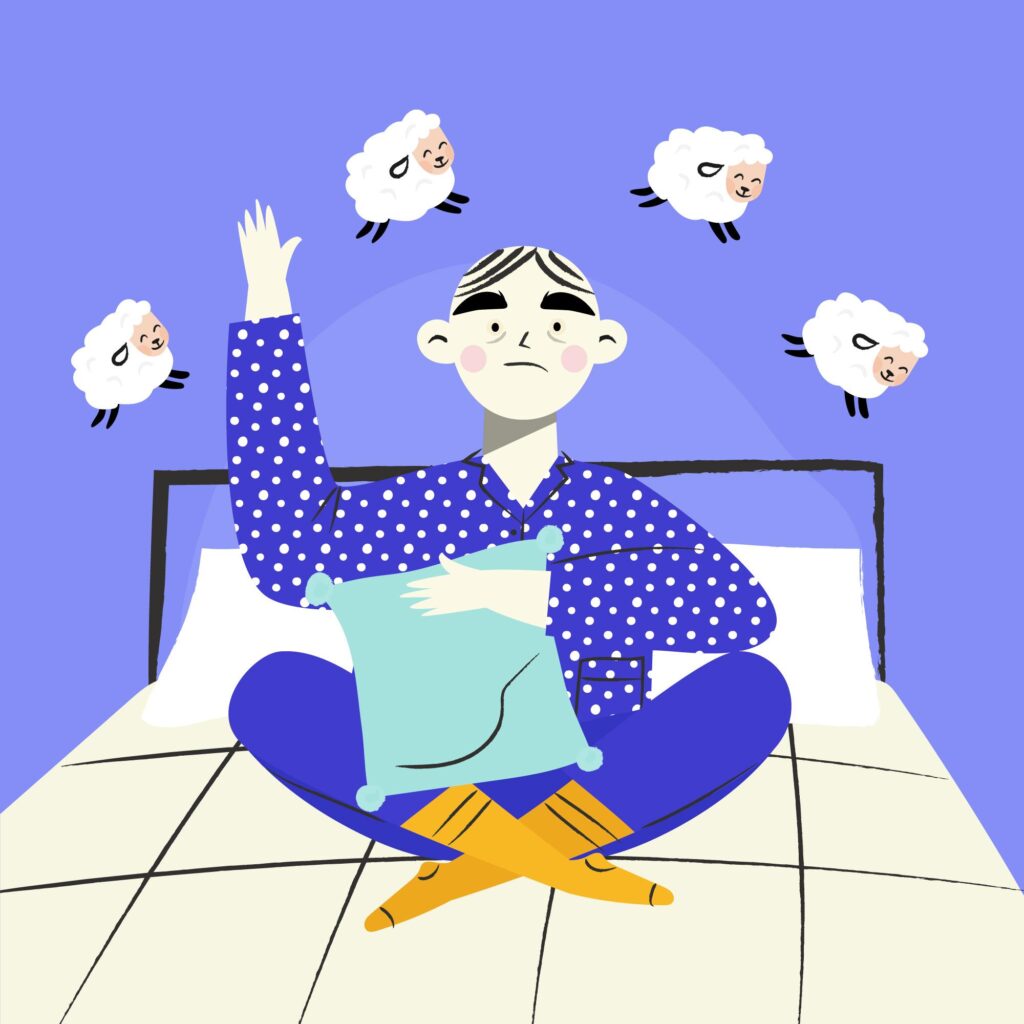
Furthermore, it is essential to recognize that migraines and insomnia can be a source of stigma and discrimination. Some people may dismiss these conditions as minor inconveniences or signs of weakness, leading to feelings of isolation and shame among those who experience them. It is important to challenge these attitudes and promote greater awareness and understanding of migraines and insomnia as legitimate medical conditions that can significantly impact one’s quality of life.
In conclusion, managing migraines and insomnia involves a comprehensive approach that takes into account lifestyle factors, relaxation techniques, medication use, and medical treatment. With the right care and support, people with migraines and insomnia can improve their quality of life and reduce the impact of these conditions on their daily activities. It is important to prioritize self-care, healthy habits, and a balanced approach to treatment.

